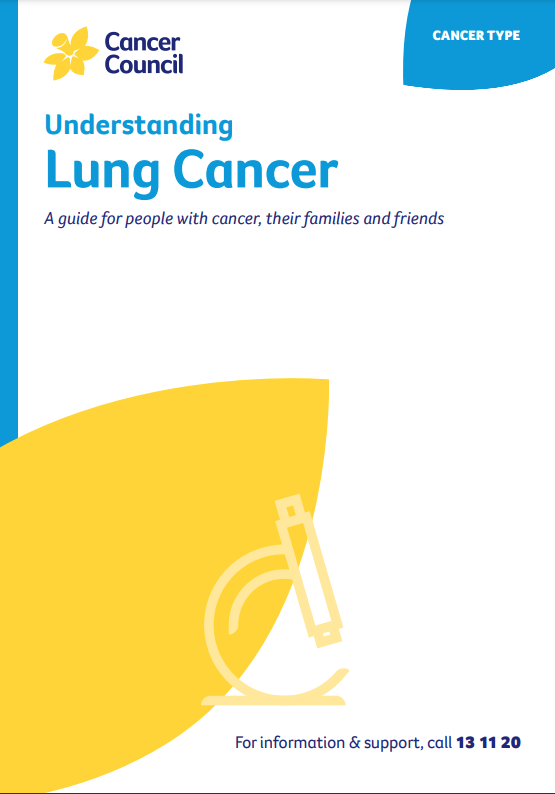- Home
- Lung cancer
- Treatment
Lung cancer treatment
Treatment for lung cancer will depend on the type of lung cancer you have, the stage of the cancer, how well you can breathe (your lung function) and your general health. All treatments chosen for you will be expected to be safe and effective.
Learn more about:
- Understanding the aim of treatment
- Treatment options by type and stage
- Making treatment decisions
- Surgery
- Radiation therapy
- Chemotherapy
- Targeted therapy
- Immunotherapy
- Palliative treatment
Understanding the aim of treatment
For early or locally advanced non-small cell lung cancer (stages 1–3 NSCLC) or limited-stage small cell lung cancer (stages 1–3 SCLC), treatment may be given with the aim of making the cancer go away. This is called curative treatment.
Because lung cancer causes vague symptoms or even no symptoms in the early stages, most people are diagnosed when the cancer is advanced (stage 4 NSCLC, stage 4 SCLC or extensive disease). This means the cancer has spread outside the lung to other parts of the body.
When cancer is advanced, the aim of treatment is often to maintain quality of life by controlling the cancer, slowing down its spread and managing any symptoms. This is called palliative treatment.
Sometimes palliative treatment can significantly shrink or control the cancer, helping people to live as fully and as comfortably as possible for many months or years.
NSCLC and SCLC are treated in different ways. There are also treatments to improve breathing.
Treatment options by type of lung cancer and stage
Non-small cell lung cancer (NSCLC)
| early (stage 1 or 2) | Usually treated with surgery, and for stage 1, a type of high-dose targeted radiation therapy called stereotactic body radiation therapy (SBRT). Stage 2 is sometimes treated with chemotherapy or immunotherapy before or after the surgery. |
| locally advanced (stage 3) | Can be treated with surgery and chemotherapy, or with radiation therapy and chemotherapy (without surgery). Immunotherapy may also be used. With some gene mutations, targeted therapy is starting to be used. Treatment will depend on where the cancer is in the lung, the number and location of lymph nodes with cancer and whether a surgeon can safely remove all of the visible cancer. |
| advanced (stage 4) | Depending on the symptoms, palliative drug treatment (targeted therapy, chemotherapy or immunotherapy), palliative radiation therapy, SBRT, or a combination of treatments may be used. This depends on the cancer cell type, how much the cancer has spread, the symptoms and the molecular test results. |
Small cell lung cancer (SCLC)
| limited disease (stages 1–3) | Usually treated with chemotherapy and radiation therapy (called chemoradiation). Sometimes, surgery may be used for stage 1 disease. |
| extensive disease (stage 4) | Mainly treated with palliative chemotherapy, with or without immunotherapy. Palliative radiation therapy may also be given to the primary cancer in the lung and to other parts of the body where the cancer has spread to help control symptoms such as pain. |
Preparing for treatment
| Stop smoking | If you smoke or vape, you will be advised to stop before you start treatment for lung cancer. Stopping smoking can improve how treatments work and reduce the impact of side effects such as breathlessness. Research shows that stopping smoking before surgery also reduces the chance of complications and can help you recover faster. To work out a plan for stopping, talk to your doctor, your nurse specialist, or call Quitline on 13 7848 (13 QUIT). |
| Eat well and exercise | Your health care team may also suggest that you eat healthy foods and exercise before starting lung cancer treatment. Preparing for treatment in this way is called prehabilitation. It can help you to cope with cancer treatment, recover more quickly and improve your quality of life. A dietitian, exercise physiologist or physiotherapist can support you to make lifestyle changes. Ask your doctor for a referral. |
→ READ MORE: Making treatment decisions
Podcast: Making Treatment Decisions
Listen to more episodes from our podcast for people affected by cancer
More resources
Dr Malinda Itchins, Thoracic Medical Oncologist, Royal North Shore Hospital and Chris O’Brien Lifehouse, NSW; Dr Cynleen Kai, Radiation Oncologist, GenesisCare, VIC; Dr Naveed Alam, Thoracic Surgeon, St Vincent’s Hospital, Epworth Richmond, and Monash Medical Centre, VIC; Helen Benny, Consumer; Dr Rachael Dodd, Senior Research Fellow, The Daffodil Centre, NSW; Kim Greco, Specialist Lung Cancer Nurse Consultant, Flinders Medical Centre, SA; Caitriona Nienaber, 13 11 20 Consultant, Cancer Council WA; Marco Salvador, Consumer; Janene Shelton, Lung Foundation Australia – Specialist Lung Cancer Nurse, Darling Downs Health, QLD; Prof Emily Stone, Respiratory Physician, Department of Thoracic Medicine and Lung Transplantation, St Vincent’s Hospital Sydney, NSW; A/Prof Marianne Weber, Stream Lead, Lung Cancer Policy and Evaluation, The Daffodil Centre, NSW.
View the Cancer Council NSW editorial policy.
View all publications or call 13 11 20 for free printed copies.

